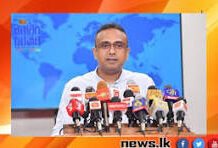Sri Lankan exporters and providers of services to the European Union (EU) market are being encouraged to develop sustainable supply chains to become part of the restart of the island’s economy to overcome the Covid-19 pandemic as fast as possible.
At a conference on ‘Sustainable Supply Chains as drivers of global competitiveness’ held on February 24 in Colombo, suppliers to the EU market were offered training and help to obtain broader market access to permit German and EU importers to bring in products according to international sustainability standards.
The conference was co-organised by the Delegation of German Industry, Commerce (AHK Sri Lanka) and the Friedrich Naumann Foundation for Freedom (FNF) in Colombo.
“Since September 2020, the two organizations in cooperation with Loening Human Rights and Responsible Business have conducted several trainings, individual gap assessments and covered the preconditions for certifications for Sri Lankan exporters in the sectors of rubber, apparel, and food products. All project partners agreed to extend the project to the Sri Lankan tourism sector,” a media release issued by the organisers said.
In opening remarks, the Chief Delegate of German Industry and Commerce and Industry in Sri Lanka, Andreas Hergenroether pointed out that sustainability standards are a reality. “They are partially politically driven, but they are also more and more consumer and industry-driven. Besides the existing official legally binding standards, European importers require more and more consumer and industry-driven standards like Fairtrade, BSCI, SA8000 and IFS,” he said.
Country Head for Sri Lanka and Bangladesh of the Friedrich Naumann Foundation for Freedom Hubertus von Welck emphasised that companies should be open for standards under the UN Guiding Principles and incorporate those in their in-house procedures.
In a video message, German Ambassador to Sri Lanka and the Maldives, Holger Seubert pointed out the relevance of the subject with regards to the upcoming Supply Chain Law in Germany. A joint inter-ministerial draft law is to be presented in mid-March to the German parliament. German importers will be under the obligation to continuously verify that their suppliers respect United Nation Guiding Principles (UNGP) of business and human rights. Violations would be sanctioned with penalties up to 10-pct of the importer’s annual turnover and exclusion from public tenders for up to three years.
During the panel discussion with company representatives of the targeted sectors of apparel, food and tourism, panelists stressed how much their businesses are related to consumer-driven sustainability requirements and how important the required documentation of UNGPs conform processes are.












